I understand to an extent that it helps applications communicate regardless of their location. Why is it important and what is an example of a real-world use of WCF?
6 Answers
WCF is a generic communication mechanism that allows you to setup generic client/host communication between two parties. The neat thing about WCF is that is allows you to configure service properties such as transport (http/pipes/tcp/Tibco EMS), security models (any of the W3C standards), compression, encoding, timeouts, etc, without changing ANY code. That is powerful. Best of all, you can configure it so that you can have a service in C# and a client in Java (or any other language or the other way around), as long as they both talk using the same mechanisms.
You can create a standard HTTP SOAP web service using WCF and one day decide to switch it to use the faster named pipes for local communication. You can create web services that talk over TibcoEMS and have easy failover on the queue level. You can create a file streaming web service that distributes all kinds of images/videos to your application.
- 17,971
- 7
- 53
- 66
-
Hey siz, thanks for the explaination it is clarifying things. – simplyme Mar 04 '09 at 16:03
Here Are some brain dump i think might be useful to understand the whole scenario.
Reason of Creating WCF : Background
Modern Application[Distributed Application] development we use different architechtures and technologies for communication
i.e:
- COM+
- .NET Enterprise Services
- MSMQ
- .NET Remoting
- Web Services
As there are various technologies. they all have different architechtures. so learning all them are tricky and tedious.
one need to focus on each technologies to develop rather than the application business logic
so microsoft unifies the capabilities into single, common, general service oriented programming model for Communication. WCF provides a common approach using a common API which developers can focus on their application rather than on communication protocol.
Now-a-days we call it WCF.

N.B: image collected from - http://www.codeproject.com/Articles/255114/Windows-Communication-Foundation-Basics
What Exactly WCF Service Stands For?
WCF lets you asynchronus messages transform one service endpoint to another.
The Message Can be simple as
- A Single Character
- A word
sent as XML
- complex data structure as a stream of binary data
Windows Communication Foundation(WCF) supports multiple language & platforms.
WCF Provides you a runtime environment for your services enabling you to expose CLR types as Services and to consume other Services as CLR Types.
A few sample scenarios include:
- A secure service to process business transactions.
- A service that supplies current data to others, such as a traffic report or other monitoring service.
- A chat service that allows two people to communicate or exchange data in real time.
- A dashboard application that polls one or more services for data and presents it in a logical presentation.
- Exposing a workflow implemented using Windows Workflow Foundation as a WCF service.
- A Silverlight application to poll a service for the latest data feeds.
Why on Earth We Should Use WCF?
from a Code Project Article, thanks to @Mehta Priya I found the following Scenarios to illustrate the concept. Let us consider two Scenario:
- The first client is using java App to interact with our Service. So for interoperability this client wants the messages in XML format and the Protocol to be HTTP.
- The Second client uses .NET so far better performance this clients wants messages in binary format and the protocol to be TCP.
Without WCF Services
now for the stated scenarios if we don't use WCF then what will happen let's see with the following images:
- Scenario 1 :

- Scenario 2:

These are two different technologies and have completely differently programming models. So the developers have to learn different technologies
so to unify & bring all technologies under one roof. Microsoft has come with a new programming model called WCF.
How WCF Make things easy ?
one implement a service and he/she can configure as many end points as it required to support all the client needs .
To support the above 2 client requirements -we would configure 2 end points -we can specify the protocols and message formats that we want to use in the end point of configuration

References:
- WCF : What , Why and When https://vishalnayan.wordpress.com/2010/12/31/wcf-what-why-when/
- Why we use WCF Service? http://www.codeproject.com/Tips/815742/Why-We-Use-WCF-Service-and-Sample-of-WCF-Service
- What Is Windows Communication Foundation https://msdn.microsoft.com/en-us/library/ms731082(v=vs.110).aspx
- Windows Communication Foundation Basics http://www.codeproject.com/Articles/255114/Windows-Communication-Foundation-Basics
There's little to add to the responses so far, especially the one from "siz".
One thing to add is that WCF is the current way to do web services on the .NET platform. It's not the "new" way, it's the current way. ASMX web services are the old and just barely maintained way. One Microsoft employee has publicly stated that only critical security fixes will be made to the ASMX platform, so if you intend for your services to be useful more than a year from now, don't use ASMX.
In addition to the typical "web service" use cases, WCF handles atypical cases, like binary communication over named pipes, message queues, etc. To a very large extent, the service you write to support something simple like SOAP over SSL can also support these other protocols, with no changes to the code.
- 160,644
- 26
- 247
- 397
To answer the "real world" bit, I'm just finishing up a dispatch system by which a Visual Basic 6.0/access alarm receiver, a WPF/SQL ERP system and an iPhone application all share information to schedule and execute jobs.
- 30,738
- 21
- 105
- 131
- 6,649
- 1
- 50
- 52
Essentially the use case is where you want two separate applications to talk to each other somehow and their locations are unknown (could be same machine (but different application domain), same network or on the other side of the internets)
You can easily embed it into a Windows Forms application. That was a nice thing to discover. It is so much easier than .NET Remoting too.
- 30,738
- 21
- 105
- 131
- 25,225
- 10
- 61
- 100
There are a number of reasons why it is advantageous over classic ASP.NET web services (.asmx).
A couple of these off the top of my head are:
The ability to have multiple bindings for the same service call means the message doesn't have to serialise into XML and back if you simply want to communicate inside a web farm.
The way contracts are defined is much more forgiving when it comes to multiple versions of the same contract.
- 30,738
- 21
- 105
- 131
- 7,821
- 10
- 48
- 68